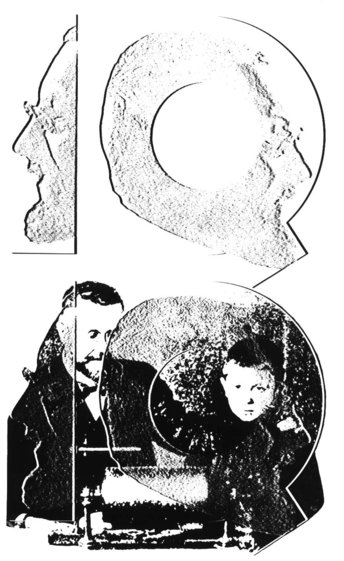Alfred Binet1857–1911
Binet introduced new methods of testing intelligence. In 1905, at the request of the French government, he devised (with Théodore Simon, 1873-1961) a test for measuring the intelligence of children, particularly aimed at distinguishing those of subnormal from normal intelligence. “The fundamental idea of the method is the establishment of what we shall call a measuring scale of intelligence. This scale is composed of a series of tests of increasing difficulty, starting from the lowest intellectual level that can be observed, and ending with that of average normal intelligence. Each group in the series corresponds to a different mental level.” He had earlier carried out informal tests of sensory acuity and reaction time (in the Galton tradition) on his own daughters, and he considered that these were inappropriate indices of intelligence - measures of memory, attention and comprehension seemed better. The first test consisted of 30 items which were presented in increasing order of difficulty. It was revised and extended in 1908: “Our principal conclusion is that we actually possess an instrument which will allow us to measure the intellectual development of young children whose age is included between three and twelve years. This method appears to us practical, convenient and rapid”. The ratio of mental to chronological age to yield an Intelligence Quotient or IQ was introduced in 1912 by William Stern (1871-1938), and it was adopted by Lewis Madison Terman (1877-1956) in developing the Stanford-Binet scale in 1916. Binet was born in Nice and received his education in Paris; although he was trained in law, like Pearson he did not practice it. He developed an interest in psychology from independent reading, particularly of the British associationists, and obtained a post with Charcot with whom he worked for eight years. In his initial publications on hypnotism Binet claimed that perceptual effects could be magnetically shifted from one side of the body to the other. Delboeuf pointed out that the subjects were well aware of the experimenter’s expectations and that this was the basis for the results. Binet eventually acceded to this criticism: “One of the principal and constant causes of error.. is suggestion, that is, the influence of the operator by his words, gestures, attitudes and even silences, on the subtle and alert intelligence of the person whom he has put in the somnambulistic state.” Binet worked at the first psychological laboratory in France (at the Sorbonne) and became its director in 1894. A year later he was a cofounder of the journal L’Année Psychologique. Binet did not consider that the complexity of intelligence could be captured by a simple ratio; while he did not introduce the concept of IQ he sowed the seeds of its invention. This is reflected in the portrayals of Binet, where the letters are not fully formed, but required his insights for their inception.
